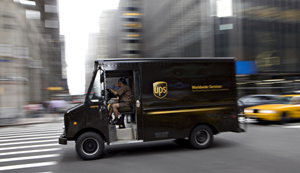(单词翻译:单击)
The number of possible routes that a UPS driver could take on any given day is enormous.
在任何一天中,UPS的司机都有许多条快递路线可以选择。
Strike that—the number of possible routes that a UPS driver could take on any given day defies comprehension. That’s not an exaggeration.
或者换个说法——UPS的司机在任何一天中,可以选择的快递路线的数目都是令人难以想象的。这绝不是夸张。
A driver for the delivery company typically makes between 120 and 175 “drops” per day. Between any two of those, there are a number of available paths to take. It is, of course, in the best interest of the driver and UPS to find the most efficient route. And that is where things get complicated.
这家快递公司的司机一般每天要送120至175次货。在任何两个目的地之间,都可以选择多条路线。显然,司机和UPS想要找到其中最有效率的那条。不过如此一来,事情就变得复杂了。

According to UPS, the number to describe the complete set of possibilities in the scenario outlined above, as calculated using combinatorial mathematics, would have 199 digits. The number of possible options would exceed the number of nanoseconds that the Earth has existed.
UPS利用组合数学的算法得出,以上所述的情景中所有可能的线路的总数,是一个199位的数字。这一数字甚至大过了换算成纳秒单位的地球年龄。
“It’s huge—unimaginably large,” said Jack Levis, the company’s senior director of process management. “This is as high as you can get in analytics.”
UPS的流程管理高级总监杰克o里维斯表示:“这数字太大了,令人难以想象。你只能从分析学上得出一个概念。”
For UPS, it was nothing if not a daunting optimization challenge. But the motivation was powerful: a reduction of just one mile a day per driver would save the company as much as $50 million.
对UPS而言,这是一项庞大的挑战。不过他们有强烈的动力去实现路线最优化:如果每位司机每天少开一英里,公司便能省下5,000万美元。
The Atlanta-based company’s answer? A system called Orion, short for On-Road Integrated Optimization and Navigation, named after the hunter in Greek mythology, and a big data analytics effort if there ever was one. Orion—whose algorithm was developed in the early 2000s and piloted through 2009—uses 1,000 pages of code to analyze 200,000 possibilities for each route in real time to deliver the optimal route in about three seconds’ time.
这家位于亚特兰大的公司是如何做的?他们研发了一个名为Orion的系统,这是道路优化与导航集成系统(On-Road Integrated Optimization and Navigation)的缩写,也是希腊神话中猎户座的名字。如果说现在有什么大数据分析学上的成就的话,那就是它了。Orion的算法诞生于21世纪初,并于2009年开始试运行。该系统的代码长达1,000页,可以分析每种实时路线的20万种可能性,并能在大约3秒内找出最佳路线。
“At first, the mathematicians thought it was going to take about 15 minutes to run,” Levis said. “They were pleased.”
里维斯表示:“起初,数学家们认为可能需要15分钟才能算出结果。所以他们很高兴。”
UPS is working to deploy the system to all of its 55,000 North American delivery routes. By the end of 2013—after being applied to just 10,000 routes so far—Orion had already saved 1.5 million gallons of fuel and 14,000 metric tonnes of CO2 emissions. The company expects to complete the rollout by 2017.
UPS正在公司全部的5.5万条北美快递线路上装配这一系统。到2013年底,Orion已经在大约1万条线路上得到使用,这让公司节省了150万吨燃料,少排放了1.4万立方公吨的二氧化碳。公司计划在2017年彻底实现该计划。
There are two “rather inconspicuous” industries that are being disrupted by big data, according to Svetlana Sicular: transportation—which includes a logistics company like UPS—and agriculture.
根据高德纳研究公司(Gartner)的分析师斯维特拉娜o西库勒的说法,有两个“很不起眼的”行业正在受到大数据的冲击,一个是运输业,其中包括UPS这类物流公司,另一个是农业。
Sicular, a Gartner analyst, believes that disruption is happening on a broad scale. Consider the commercial shipping industry: the Australian Maritime Safety Authority provides information about port activity in real time so that ships can vary their speed to save fuel and minimize port fees, Sicular said. The authority also uses geofencing—dynamic, location-based digital zones—to trigger and automate those fees, “and this is all transparent through open data,” she said.
西库勒相信这一冲击会波及很大范围。西库勒表示,可以看看通商航运业的例子:澳大利亚海事安全局(Australian Maritime Safety Authority)提供了实时的港口活动信息,船只可以据此改变航速,节省燃料,让港口服务费降到最低。海事局还使用了地理围栏(一种动态的数字定位区域)来触发和自动计算这些费用。她说:“通过公开数据,这一切都是透明的。”
It’s not just big data technologies that are causing this transformation, Sicular said. The convergence of mobile devices and cloud computing also play a major role.
西库勒表示,导致这种转变的不仅仅是大数据技术,移动设备和云计算在其中也扮演了重要角色。
“Mobility is important in collecting information and providing live connection to the drivers,” she explained. “Mobility is not just about mobile devices but also about sensors in trucks, planes and ships.”
她解释说:“在收集信息、给司机实时提供数据上,移动性起到了重要作用。这不仅是指移动设备,还包括卡车、飞机和轮船上的感应器。”
Feeling pressure to make its operations more efficient, UPS introduced handheld devices for its drivers in the 1990s. “We had to create smartphones and communications online before they existed,” Levis said. In 2008, the company installed GPS tracking equipment on its delivery trucks. Orion is layered on top of this foundation.
在提高运营效率的压力下,UPS在20世纪90年代为司机引入了手持设备。里维斯表示:“我们必须在智能手机和网络通信出现前就发明它们。”2008年,公司在运货卡车上安装了GPS追踪系统,而Orion则建立在这一基础上。
Though there’s no easy replacement for a continent-spanning fleet of vehicles—until Amazon’s delivery drones materialize, anyway—the rise of cloud computing has made it easier for startup companies to access the sophisticated technology that only the largest enterprises previously enjoyed. It behooves UPS to stay ahead.
尽管想要取代在大陆上川流不息的汽车快递不是件容易的事——总之,在亚马逊(Amazon)的无人机快递正式得到使用前是这样——但云计算的兴起让初创公司更容易接触到之前只有大型企业才能拥有的尖端技术。UPS理应走在前面。
“To me, that’s the future of analytics and big data—not just telling you what has happened, but telling you what should happen and how to correct it in real time,” Levis said. “If a system is so smart that it predicts you’ll have a problem and solves it before it happens, it’s like Sherlock Holmes. It looks clairvoyant, but it’s not.
里维斯表示:“对我来说,这就是分析技术和大数据的未来——不仅仅是告诉你发生了什么,还能告诉你将要发生什么,如何实时纠正它们。如果有个系统可以智能到预测你的问题,并在它发生前予以解决,那它就像福尔摩斯一样了。看起来像千里眼,但实际上不是。”
“It will take a while. But that’s the vision.”
“把它变成现实还需要一段时间。不过这就是未来的景象。”


